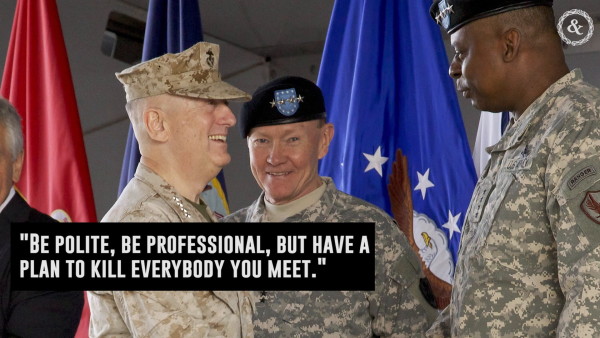

Nearly two weeks after he submitted his resignation letter, former Defense Secretary James Mattis has officially left the Pentagon. The building already feels like a less lethal place.
The legendary Marine general has been replaced by former Boeing executive Patrick Shanahan, who has a reputation for being able to solve complicated problems. (As the Pentagon’s space guy, he is also the defense official whom your friendly Pentagon correspondent once asked if Space Force needed a Starfleet Academy and rifle squads to “seek out and destroy other lifeforms.”)
“As acting secretary of defense, I now look forward to working with President Trump to carry out his vision alongside strong leaders including the service secretaries, the Joint Chiefs of Staff, the combatant commanders, and senior personnel in the office of the secretary of defense,” Shanahan said in a Jan. 1 statement.
Although he has never served in the military, Shanahan said during a recent interview that he draws inspiration from his father, former Army Capt. Mike Shanahan, who served in the 18th Military Police Brigade during the Vietnam War.
“I grew up in a family of service and of course I didn’t do any … but when Secretary Mattis called up and he said, ‘Hey, I need you to come help.’ It was easy,” Shanahan told CNBC’s Amanda Macias on Dec. 19.
Wednesday marked Shanahan’s first full working day as acting defense secretary. During a morning meeting at the Pentagon, Shanahan told top military leaders, “Remember: China, China, China,” a defense official told reporters.
But it became very clear shortly thereafter that Shanahan’s greatest challenge would not be China, or Russia, or even new lifeforms. Like his predecessor, Shanahan will be at the mercy of President Donald Trump, who frequently blows up his advisors’ attempts at thinking strategically by making impulsive decisions, such as withdrawing all U.S. troops from Syria, which prompted Mattis’ Dec. 20 resignation.
During a televised cabinet meeting that Shanahan attended on Wednesday, Trump claimed that he had fired Mattis for failing to make progress in Afghanistan; that the U.S. military should let the Taliban and ISIS fight themselves; that the Soviets only invaded Afghanistan after they were attacked by terrorists (they weren’t), and that Russia should send troops there now; and he added, “I think I would have been a good general, but who knows.” (During the meeting, a large poster of Trump with the words “Sanctions Are Coming” was laid in front of the president.)
For those of you old enough to remember “The Matrix,” Shanahan has essentially swallowed the Red Pill: He’s staying in Wonderland to see how deep this rabbit hole really goes.
At Boeing, Shanahan proved to his bosses that he could deliver whatever they asked for, wrote Jon Ostrower, editor of the Air Current blog.
Ostrower, who covered Shanahan for nearly a decade, described him as a “tactical genius as a process engineer” with an extremely low tolerance for nonsense. When Boeing’s 787 Dreamliner was plagued with SNAFUs, Shanahan micromanaged the project to success.
“Micromanaging is what he was sent in to do,” Ostrower told Task & Purpose. “He was there to fix things. If things were broken, it meant that internally people weren’t moving in the right direction toward finishing what they were trying to deliver. He was there because things got really bad.”
Unfortunately, the problem-solving skills he honed while working at Boeing for more than 30 years do not translate well into his current position, said Richard Aboulafia, a military and commercial aviation industry analyst with the Teal Group, an aerospace consulting firm in Washington, D.C.
“It’s a cabinet level position: You are not making things more efficient or streamlining processes; you’re dealing with the president and world leaders and setting the national defense posture,” Aboulafia told Task & Purpose. “That’s a completely new job.”
The defense secretary’s job is even more difficult under this administration because Trump has wanted to pull the United States out of NATO and cancel long-standing alliances, Aboulafia said. In the past, Mattis and other advisers had the clout to stand up to the president on such issues.
“Now, for better or worse, that’s all in the past and we’ve got Pat Shanahan – who’s really good at processes, but we’ll see,” Aboulafia said.
SEE ALSO: How The US Went From ‘Rapid Withdrawal’ To ‘No Timeline’ In Syria
WATCH NEXT: President Trump Attempts To Explain USSR-Afghanistan History
Jeff Schogol covers the Pentagon for Task & Purpose. He has covered the military for 13 years and embedded with U.S. troops in Iraq and Haiti. Prior to joining T&P, he covered the Marine Corps and Air Force at Military Times. Comments or thoughts to share? Send them to Jeff Schogol via email at schogol@taskandpurpose.com or direct message @JeffSchogol on Twitter.